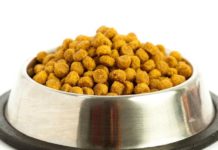
Our bodies require nutrients to grow, repair after injury, keep our hearts beating, inhale oxygen and exhale toxins, maintain a normal metabolic rate, and even to rest peacefully at night. If those nutrients do not come in the food we eat then they must come in the form of a supplement.
Our four-legged family members are no different. In fact, in many cases, our pets require more nutrient dense food pound per pound depending on appetite and energy levels. Higher the energy and exercise levels, the more nutrients are required to maintain a healthy body but if a dog has a poor appetite or a compromised digestive system that does not efficiently absorb available nutrients, he may not be getting all that he needs.
What are Common Supplements in Dog Food?
Most dog food is nutritionally balanced meaning that the correct amount of protein, fat, and carbs are optimally formulated for good health. Common supplements in dog food include vitamin A, C, D, and E as well as minerals such as iron, calcium, and zinc.
Vitamin A is vital for healthy eyes and vision as well as poor or retarded growth in puppies. Usually dogs with a Vitamin A deficiency suffer from a variety of skin conditions and a lackluster coat quality. Vitamin A is a fat-soluble vitamin however, meaning that it is absorbed and stored in the fat unlike water-soluble vitamins that are excreted if excess amounts are ingested so watch for over supplementing your dog.
Vitamin C and E are antioxidants that have a dual function in dog food – preserving the food and keeping your pet healthy. Vitamin C helps maintain the health of connective tissue and strengthens the immune system. it stimulates the production of interferon, an essential part of red blood cell and adrenalin production.
Vitamin E is fat-soluble but so far a toxic level of the vitamin has not been found for dogs. Vitamin E is an essential part of the formation of cell membranes, cell respiration, and metabolism of fats. Vitamin E deficiency causes what is referred to as ‘brown bowel syndrome’, a condition where the bowels ulcerate and leak blood into the stool. Although not as obvious, the cells of the testes and eyes are also similarly affected.
Vitamin K is a fat-soluble vitamin that is produced by healthy bacteria in the intestine so it is not as vital as other vitamins as a supplement in dog food.
Iron is an extremely common mineral supplement in dog food as the mineral plays a vital role in your pet’s continued good health. Iron deficiency causes red blood cell production to slow down or produce small, ineffective cells. Without red blood cells, not enough oxygen is carried to the brain or organs causing a range of illnesses and eventual death. Symptoms of iron deficiency include a decreased growth rate in puppies and development in pregnant females, anorexia, lethargy, weakness, depression, rapid or panting breathing, dark tar colored stools, and fainting.
Calcium is one of the most important supplements yet also difficult to regulate. Calcium plays a vital role in bone formation, blood coagulation, muscle contraction and nerve impulse transmission as well as helping to regulate the metabolic system. Too much calcium can cause bone malformation in puppies however and should be extremely well monitored in large and giant breed dogs.
Zinc is a difficult mineral to regulate in a dog’s normal diet. Studies show that only 5% to 40% of dietary zinc is absorbed with many northern breeds of dogs such as the Alaskan malamute and the Siberian husky that have an inability to absorb adequate levels of the mineral. Zinc deficiency is associated with skin problems including zinc responsive dermatosis while over supplementing zinc in your dog’s food can cause problems absorbing calcium and vice versa.
Other Types of Supplements in Dog Food
Herb and natural food supplements are now common in dog food. In fact, food is formulated for specific health problems as both a treatment and a preventive.
Does your dog suffer from arthritis or is he a large breed prone to hip dysplasia and joint problems? Feeding him a top quality large breed formula dog food that includes glucosamine hydrochloride, chondroitin, and MSM can help slow down or prevent degeneration of the joints, leaving him to lead a healthier, happier life!
What about bad teeth and periodontal disease? Small dogs are prone to overcrowding of teeth in their tiny mouths. This leads to food becoming lodged between the teeth and makes brushing their teeth effectively more difficult. Supplementing your dog’s food with an oral health combo can help prevent gum disease and tartar build up.
Has your dog been ill or recently suffered an accident, lowering their natural immune system? Or maybe they suffer from a chronic condition such as diabetes that lowers their immune system. Give them a boost by supplementing his dog food with an antioxidant immune booster! Common ingredients include green tea powder, vitamin C, vitamin E, and alpha lipoic acid.
Always check with your veterinarian or a veterinary nutritionist before adding supplements to your pet’s diet. Most dog food comes with a nutritionally balanced and moderate amount of added nutrients. However, for many dogs, the nutrients included in their diet are not enough and supplement your dog’s food offers them better health and a longer, happier life!





